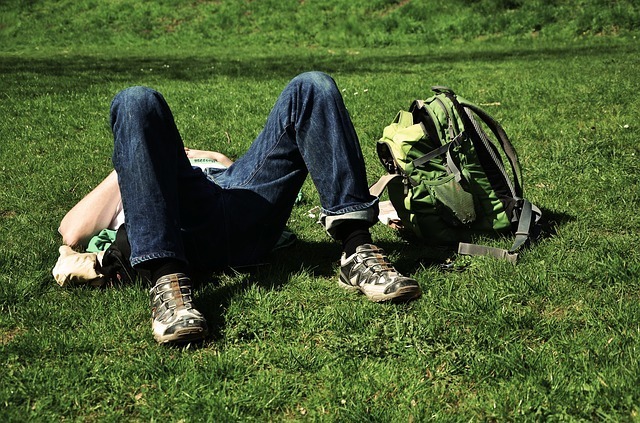All adolescents and self-proclaimed night owls know the struggle of maintaining a “normal” sleep schedule.
You may find that you just cannot sleep at a conventional bedtime (like 10 p.m.) or that it’s difficult to rise at such an early hour each day (like 6 or 7 a.m.).
If this is the case, then you may be suffering from delayed sleep phase syndrome. Let’s take a look at what this syndrome is, what causes it, and various delayed sleep phase syndrome treatment options.
What Is Delayed Sleep Phase Syndrome?
Delayed sleep phase syndrome (or DSPS, for short) is a circadian rhythm sleep disorder.
It displaces or delays a person’s circadian rhythm, or body’s internal clock, by two or more hours, resulting in difficulty sleeping and waking up at times deemed appropriate by society. This then leads to sleep deprivation and excessive daytime sleepiness.
Many people who suffer from DSPS liken it to constantly living with jet lag. In fact, the disorder has often been referred to as “social jet lag.”
For example, instead of falling asleep at 10 p.m. and waking at 6:30 a.m., those suffering from DSPS may find they cannot fall asleep until well after midnight – no matter what they do. They also experience difficulty waking up at earlier times to get ready for the day.
Your circadian rhythm regulates the times at which you eat and sleep, so the sudden shift this disorder creates can be debilitating. Researchers have suggested that people with DSPS may actually have a circadian rhythm longer than most people’s 24-hour cycles.
In fact, patients with DSPS claim they feel most awake during the evening or late-night hours, when most people are already asleep.
Causes
The exact cause of DSPS is not known, but certain factors can contribute to the likelihood of developing this disorder over time.
Genetics
If you have a close relative who suffers from delayed sleep phase syndrome, then you are more likely to suffer from this condition.
Up to 40 percent of patients with this disorder have a family history of delayed sleep phase syndrome. Genetics can help you out sometimes, but they can also be a pain.
Puberty
When you go through puberty, your circadian rhythm becomes longer than a normal 24-hour period. As such, you typically want to fall asleep and wake up at much later times as a result.
This is generally why teenagers are labeled as sleepy or lazy, but it’s just a natural part of the growing process.
It certainly does not help that most adolescents must take on more responsibilities during this transition period. This leaves them with less time to recover and more exhaustion throughout the day.
Psychological and Neurological Disorders
People who also suffer from depression, anxiety, attention deficit hyperactivity disorder (or ADHD), or obsessive-compulsive disorder (OCD) have a higher chance of developing this sleep disorder as well.
Poor Sleeping Habits
Keep in mind that someone with delayed sleep phase syndrome is not quite the same as a night owl. Night owls choose to stay up late to socialize, work on homework, or perform other tasks.
They also choose to wake up later, when they can, so as to compensate for their late-night activities. If they have to follow a normal sleeping routine, they are able to adjust their schedules accordingly.
People who have DSPS, on the other hand, have no choice. Some people who describe themselves as night owls often suffer from DSPS and may not even realize it.
Symptoms
- It is difficult falling asleep when you want.
- You feel unable (or unwilling) to wake up at the early times you want.
- When left to follow your own schedule, you are able to get quality sleep for a normal amount of time. Only, these sleeping periods are much later than what is deemed socially acceptable.
- You have delayed sleep patterns for at least seven days.
Who Suffers From It?
DSPS commonly affects teenagers, due to puberty extending their circadian rhythms longer than the usual 24-hours cycle.
As many as 7 percent of all teenagers find it difficult to fall asleep at night and wake up early in the morning because of this. Worse yet, many school schedules do not help relieve this at all.
Older people may be susceptible to this disorder, too, but the likelihood is lower than it is for teenagers.
How Delayed Sleep Phase Syndrome Diagnosed?
What’s Required
According to the DSM-IV manual of psychiatric disorders, the sleep disturbance you experience as a result of DSPS must be deemed “clinically significant” for you to be properly diagnosed.
As such, your DSPS has to severely impair your ability to function throughout the day, and cannot be the result of another sleep or mental health disorder.
Perhaps Visit a Sleep Therapist First
Because of this, DSPS is often misdiagnosed as depression or insomnia. It can be difficult for people who only have a surface-level understanding of their symptoms to explain what is happening to them.
As such, it helps to talk to a sleep specialist if you experience any of the above symptoms.
Examine Medical History
A sleep specialist can perform several delayed sleep phase syndrome tests to properly diagnose you with this disorder.
First, they will examine your medical history to see if your symptoms have run in your family or if you may be suffering from another sleep disorder altogether.
Sleep Journal
They may also have you record the times when you fall asleep and wake up each day for an entire week, so as to analyze your sleep patterns.
It’s recommended to keep a log before you visit your first appointment, so it saves the specialist time.
Actigraphy
The sleep specialist may have you wear an actigraphy, which is a device worn on your wrist to track your sleep-wake patterns.
Sleep Clinic
If they believe you have a different sleep disorder, however, they may request you sleep overnight at a sleep clinic, undergoing a polysomnogram test.
This test monitors your brain waves and heart rate while you sleep, and can help your doctor determine the cause of your sleep disorders.
This video goes into more detail on delayed sleep phase disorder.
Delayed Sleep Phase Syndrome Treatment
Medication
A sleep specialist may prescribe melatonin supplements or other natural sleep-inducing drugs. These may help you sleep a little earlier in the night.
Melatonin is basically a hormone that signals to your body when it’s time to head for bed. Melatonin levels start to rise at around 9 p.m. and usually stay elevated for 12 hours.
Melatonin supplements are the only hormone supplement available in the U.S. that you can obtain without a prescription. They also do not need to be approved by the Food and Drug Administration (FDA) or controlled in the same way as drugs.
Melatonin is often sold as a dietary supplement, because it is naturally contained in various foods.
Caution:
This lack of regulation means that synthetic melatonin supplements, made in factories, may have listed-doses that are neither controlled nor particularly accurate.
As such, the amount of melatonin you consume per pill may be far more or much less than the amount listed on the package.
Most synthetic supplement packages offer dosages that produce levels of melatonin far higher than what your body can naturally produce at night. Even the typical dose of about 1 to 3 milligrams may elevate your blood melatonin levels as much as 1 to 20 times the normal amount.
Just know that if you do choose to take melatonin supplements, you should always pay attention to the dosage you consume each time. Otherwise, you may oversleep and miss school or work the next day.
Natural Remedies
Sleep specialists often recommend natural remedies for their patients to try, either alongside taking melatonin supplements or by themselves.
Bright Light Therapy
Bright light therapy is performed by using light to gradually shift your sleep schedule to a more socially acceptable time.
This usually requires using a special light box right when you wake up in the morning (for approximately half an hour) to help reset your body’s internal clock. Being exposed to bright light just as you wake up will lower your melatonin levels and help you feel more alert throughout the day.
Your sleep specialist should recommend which commercially available light boxes are right for you, as well as how to properly use them.
You must also reduce your exposure to bright lights in the evening hours, since a lack of light will signal to your body that it is time to sleep. This also means avoiding any screens about an hour before bed, whether they be for work or to help you wind down.
Chronotherapy
Chronotherapy involves delaying your bedtime and waking times by about two hours, each day, over the next few days. This will help you completely reset your circadian rhythm to a ‘normal’ setting.
For example, if you typically go to bed at 5 a.m. and wake up at around 1 p.m. every day, you should try staying up until 7 a.m. and then waking up at 4 p.m. the next day.
The day after, you will stay up until 10 a.m. and then wake up at 6 p.m., continuing this two-hour pattern until you find yourself going to bed relatively earlier in the evening and waking up in the early morning.
At the most, the above example will take about a week to complete. However, some people may want to adjust their sleep schedules a little slower, instead opting to follow the same two-hour shifts for more than a week to help them adjust their schedules better.
People who only suffer from mild symptoms, on the other hand, may find it easier to simply shift their sleep schedule to an earlier time of the night and avoid doing chronotherapy altogether.
Because of how disruptive chronotherapy can be to your daily routine, it is used far less frequently than prescription medications, light therapy, or cognitive behavioral therapy.
Here’s a video with more information on chronotherapy.
Cognitive Behavioral Therapy
Bright light therapy is often combined with cognitive-behavioural therapy as a treatment option, especially for children and adolescents.
Cognitive-behavioural therapy can help you reevaluate any harmful actions or thoughts you practice that prevents you from sleeping earlier at night.
The treatment may also involve developing habits that promote better sleeping patterns, such as meditating before bed or developing a sleep routine.
How to Prevent Delayed Sleep Phase Syndrome
Maintain Consistency
Once your body becomes accustomed to falling asleep and waking up at your desired times, it is very important to follow this schedule as strictly as possible.
This means that you must rise and go to sleep early, regardless if it is a weekend or weekday.
Avoid Sleep-Disrupting Habits
It is very important to avoid consuming certain foods and drinks, as well as performing certain activities at least one hour before you plan on going to sleep.
This means that you should avoid using any electronics, consuming caffeine or alcohol, smoking tobacco, or doing any sort of vigorous exercise before bed.
Perhaps Embrace It
On the other hand, when patients with delayed sleep phase syndrome are allowed to follow their own delayed sleep schedules (such as sleeping at 4:00 a.m. and rising at 1:00 p.m., for instance), many of them find their sleep quality improved.
They also do not feel as excessively sleepy as when forced to follow a more conventional schedule. This may be problematic for your social or work life, but it will have you performing at your best.
Can It Be Cured?
The above treatment options can help you manage your symptoms. Unfortunately, however, there is no known cure for this disorder.
Usually, a teenager who has DSPS will never grow out of it. Patients with DSPS often find that it continues well into adulthood, so you need to maintain your treatment plans as consistently as possible.
The most you can do is to stick to a strict sleep and wake schedule, tempting as it might be for you to stay up on the weekends and sleep in when you can.
Conclusion
Delayed sleep phase syndrome can be quite debilitating to handle, especially for growing teenagers.
Nonetheless, following strict sleep and wake times, alongside other treatment options, can help to improve your sleep quality and help your body adjust to a more conventional schedule.
How do you cope with delayed sleep phase disorder or DSPS?









